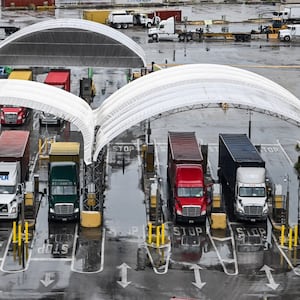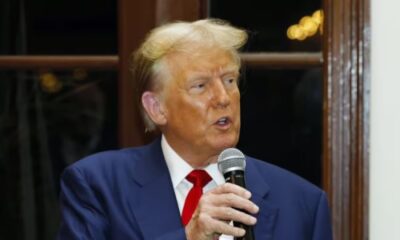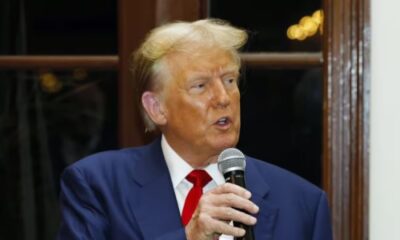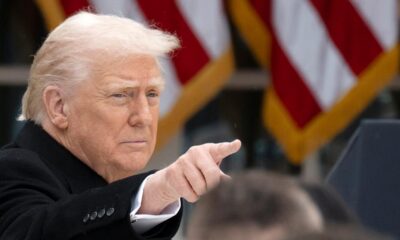Business
Trump Imposes 100% Tariff on Foreign Pharmaceuticals Starting October

US President Donald Trump has announced a significant escalation in trade policy by imposing a 100% tariff on foreign pharmaceuticals starting October 1, 2023. This move, detailed in a post on his Truth Social platform, aims to incentivize pharmaceutical companies to establish manufacturing operations within the United States.
The announcement marks a revival of Trump’s global trade war, reflecting some of the most stringent measures since the implementation of reciprocal tariffs earlier this year. “We will be imposing a 100% Tariff on any branded or patented Pharmaceutical Product, unless a Company IS BUILDING their Pharmaceutical Manufacturing Plant in America,” Trump stated. This decision underscores his administration’s ongoing commitment to reshaping the landscape of American manufacturing and reducing dependency on foreign imports.
Impact on the Pharmaceutical Industry
The tariff affects a broad range of pharmaceutical products, targeting both large corporations and smaller foreign companies. The policy aims to bolster domestic production by making it economically challenging for foreign manufacturers to sell their products in the US market without a physical manufacturing presence. This could prompt companies to reevaluate their supply chains and consider relocating operations to the United States.
In a separate post, Trump also announced a 25% tariff on all heavy trucks manufactured overseas, including those from major international brands such as Volvo and Daimler. This tariff is intended to support US manufacturers like Peterbilt, Kenworth, Freightliner, and Mack Trucks, who compete directly with these foreign brands in the American market.
The implications of these tariffs are far-reaching. They may lead to increased prices for consumers and potential disruptions in the supply chain of essential pharmaceuticals. The healthcare sector, in particular, may face challenges as companies adjust to the new financial landscape.
Reactions and Future Considerations
The reaction from industry stakeholders and political analysts has been mixed. Some view these tariffs as a necessary measure to protect American jobs and stimulate domestic production. Others express concern that such aggressive trade policies could lead to retaliatory measures from foreign governments, potentially escalating tensions and impacting global trade relationships.
As the October deadline approaches, companies will need to prepare for the changes. The administration’s focus on domestic manufacturing aligns with its broader economic strategy but raises questions about the long-term sustainability and impact on international trade partnerships.
In summary, President Trump’s announcement of a 100% tariff on foreign pharmaceuticals signals a significant shift in US trade policy. As the administration seeks to bolster American manufacturing, stakeholders across various industries will need to navigate the evolving landscape in the coming months.
-

 World1 week ago
World1 week agoPrivate Funeral Held for Dean Field and His Three Children
-

 Top Stories2 weeks ago
Top Stories2 weeks agoFuneral Planned for Field Siblings After Tragic House Fire
-

 Sports3 months ago
Sports3 months agoNetball New Zealand Stands Down Dame Noeline Taurua for Series
-

 Entertainment3 months ago
Entertainment3 months agoTributes Pour In for Lachlan Rofe, Reality Star, Dead at 47
-

 Entertainment2 months ago
Entertainment2 months agoNew ‘Maverick’ Chaser Joins Beat the Chasers Season Finale
-

 Sports3 months ago
Sports3 months agoSilver Ferns Legend Laura Langman Criticizes Team’s Attitude
-

 Sports4 weeks ago
Sports4 weeks agoEli Katoa Rushed to Hospital After Sideline Incident During Match
-

 World2 weeks ago
World2 weeks agoInvestigation Underway in Tragic Sanson House Fire Involving Family
-

 Politics2 months ago
Politics2 months agoNetball NZ Calls for Respect Amid Dame Taurua’s Standoff
-

 Top Stories2 weeks ago
Top Stories2 weeks agoShock and Grief Follow Tragic Family Deaths in New Zealand
-

 Entertainment3 months ago
Entertainment3 months agoKhloe Kardashian Embraces Innovative Stem Cell Therapy in Mexico
-

 World4 months ago
World4 months agoPolice Arrest Multiple Individuals During Funeral for Zain Taikato-Fox





















